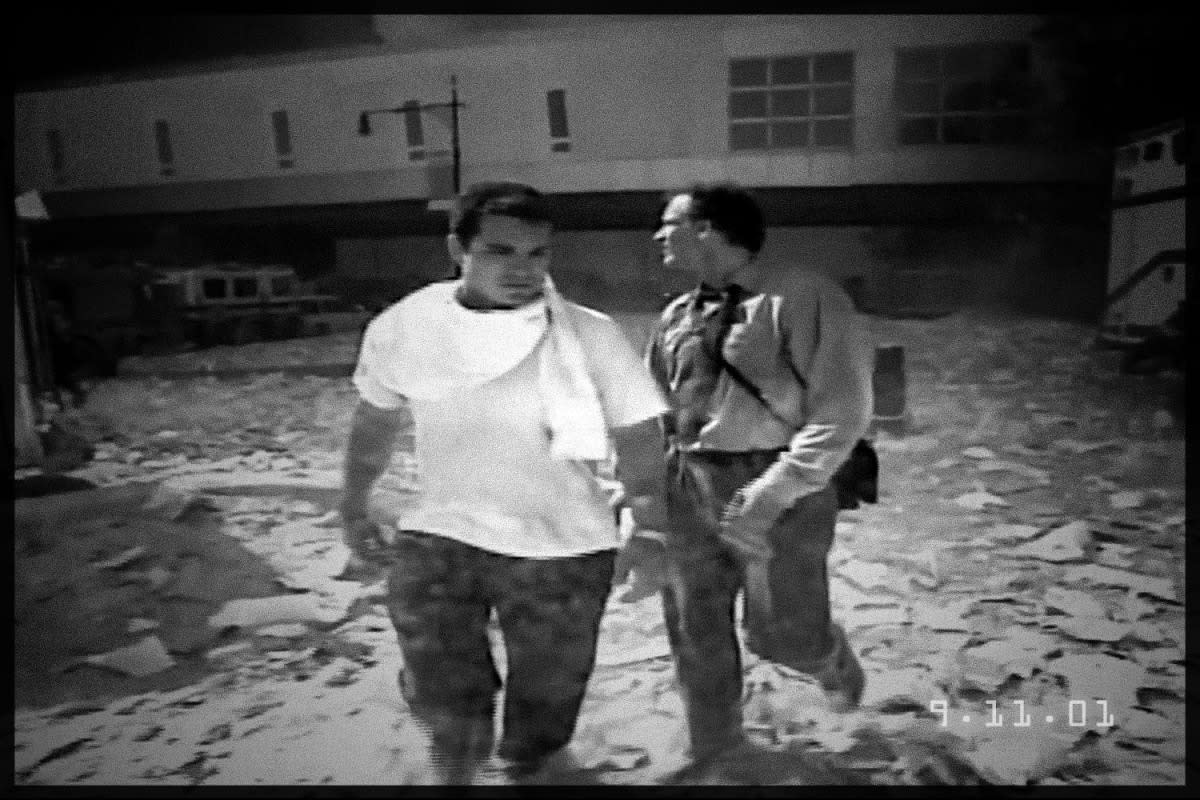How a Hero of 9/11 Would Like to Remember That Day

- Oops!Something went wrong.Please try again later.
In the days following the Sept. 11, 2001, attacks on the World Trade Center and Pentagon, a few heroes emerged amid a chaotic narrative. One of them was John Cerqueira. Fresh out of North Carolina State at age 22 and living with a roommate in a converted one-bedroom on the Upper East Side three months into an NYC telecoms job he didn’t really like, Cerqueira spent the early morning of 9/11 helping a woman in a wheelchair scramble down a staircase at 1 World Trade Center. Days later, he was the focus of glowing features in USA Today and People, and later made appearances on Good Morning America and The Oprah Winfrey Show.
Now married, a dad to a nine-year-old and based in Raleigh, NC, Cerqueira still frequently talks about that terrible day, whether it’s to non-profits, local news or, well, InsideHook. My query, however, was a little different: How and why do you continue to talk about what might be the worst day of your life, 20 years after the fact? Even if it includes talking to Oprah? (“She’s a magical spirit,” Cerqueira admits.)
“I think the more interesting story is what you learn from an experience like that, where I am now and how I evolved,” says Cerqueira, talking to us via Zoom on a mid-August weekday afternoon. “I’m 42 now, not 22. When I talk about it, it’s ‘here’s how I am now’ and less of a forensic description.”
But of course we do talk about that day — I worked in Manhattan at the time as well. For people who were there, you compare notes. Cerqueira recounts his story with the ease of someone who’s told the story a thousand times before — running out of the bathroom on the 81st floor, making his way downstairs, hearing some people on the 68th floor, and then realizing a woman in a wheelchair needed help getting down (that employee had also been in the WTC during the ‘93 bombing; a special lightweight emergency wheelchair had been installed on the floor after that earlier terrorist incident).
So he and his boss helped get her down. The tower toppled five minutes later. Eventually walking uptown and away from the area, he spoke with a reporter and mentioned the woman he saved, noting that he had helped get her into an ambulance but didn’t know if she had actually made it out of the area. (She had.)
If you want a play-by-play of the heroic act, there’s a lot more to the story, and it’s available all over the internet. But Cerqueira understands his heroism won’t continue to resonate unless there is a lesson to be derived from it today.
“I’m considering a time when I don’t want to talk about this,” says Cerquiera. “A time when I don’t just show up as a character. What I really want to do is pivot from what I did as a 22-year old in 2001 … a third of today’s workforce doesn’t even remember that day. Now, I’m interested in shifting the focus to not just what I learned, but what other people can learn from this. And I’d like to make that engagement the rest of my professional life.”
Cerqueira currently works as strategic sales professional at Aslan Training; interestingly, it has very little to do with making a sale. As he tells InsideHook, “It’s not about greed. Part of what I do, professionally, is get people to focus on serving someone else.”
It’s sort of a mixture of the Golden Rule and Eastern philosophy. “I think what I want to teach people is how to emanate love, service and goodness without any expectations of reciprocity,” he says. “For example, people ask me if I freaked out that day. I wasn’t freaked out. I was in a confined space and knew we had to get out, but my focus was on helping someone else and not worrying about myself. I mean, that’s Buddhism, Taoism, etc. Desire is what causes suffering. It’s such a relief to let go and love. And it’s turned into what I do.”
While Cerqueira has returned to New York a few times, 9/11 and that time period still haunt him in small ways. During a recent stay on the Upper East Side, a loud rumbling beneath him caused a moment of panic; turns out he wasn’t aware of the new Second Ave. subway. For the most part, he’s also avoided the area around the old WTC (partially out of the emotional toll, and “wanting to respect the space of those who lost someone”).
Plus, it’s not really his city anymore. “I feel old,” he admits. “I come here now to catch a glimpse of my twenties. New York was intrinsically linked to my personality, but I’m a stranger here.”
That said, Cerqueira does think lessons learned 20 years ago in New York can have an enduring impact, pointing to our current COVID-19 pandemic. “That’s the closest a lot of people have been to a crisis,” he says. “I hope what I do can help people manage through that kind of adversity.”
More Like This
This article was featured in the InsideHook NY newsletter. Sign up now for more from all five boroughs.
The post How a Hero of 9/11 Would Like to Remember That Day appeared first on InsideHook.
The article How a Hero of 9/11 Would Like to Remember That Day by Kirk Miller was originally published on InsideHook.

